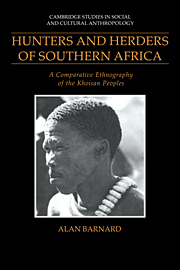Book contents
- Frontmatter
- Contents
- List of figures and maps
- List of tables
- Preface
- A note on orthography
- Part I The Khoisan peoples
- Part II A survey of Khoisan ethnography
- Part III Comparisons and transformations
- 12 Settlement and territoriality among the desert-dwelling Bushmen
- 13 Politics and exchange in Khoisan society
- 14 Aspects of Khoisan religious ideology
- 15 Bushman kinship: correspondences and differences
- 16 Khoe kinship: underlying structures and transformations
- 17 Conclusions
- References
- Index
- Cambridge Studies in Social and Cultural Anthropology
15 - Bushman kinship: correspondences and differences
Published online by Cambridge University Press: 05 June 2012
- Frontmatter
- Contents
- List of figures and maps
- List of tables
- Preface
- A note on orthography
- Part I The Khoisan peoples
- Part II A survey of Khoisan ethnography
- Part III Comparisons and transformations
- 12 Settlement and territoriality among the desert-dwelling Bushmen
- 13 Politics and exchange in Khoisan society
- 14 Aspects of Khoisan religious ideology
- 15 Bushman kinship: correspondences and differences
- 16 Khoe kinship: underlying structures and transformations
- 17 Conclusions
- References
- Index
- Cambridge Studies in Social and Cultural Anthropology
Summary
Introduction
In an earlier paper (Barnard 1981), I compared the kinship systems of four well-known Bushman groups. I shall re-examine these same systems here, with a view towards uncovering the underlying structures which are implicit in the data. In the final section, I shall look again at the relationship terminology structure of the Eastern ≠ Hoã, in the light of the comparisons drawn between the other Khoisan systems. My method of comparison is deliberately both intuitive and formal, and as such may put off radicals on both sides – zealous formalists and passionate interpretivists, alike. Its advantage is that it does help to elucidate structures which are otherwise only partly known.
In Chapter 12, I compared the settlement patterns of the !Kung, Nharo, G/wi, and !Xõ and noted the considerable differences between them. The kinship systems of these four groups also exemplify a diversity of forms. Nevertheless, they have two important common attributes – universal kin categorization and a universally extended distinction between joking partners and avoidance partners. Implicit in these attributes is a common set of relationship categories whose labels differ according to both language and the classification of specific genealogical positions. The more significant differences all stem from transformations in the defining principles of these categories. These include the means by which the joking/avoidance distinction is extended, the relationship between the joking/avoidance distinction and the rules of marriage, and the presence or absence of an explicit ideology (in addition to a practice) of universal kin-category extension.
- Type
- Chapter
- Information
- Hunters and Herders of Southern AfricaA Comparative Ethnography of the Khoisan Peoples, pp. 265 - 281Publisher: Cambridge University PressPrint publication year: 1992



